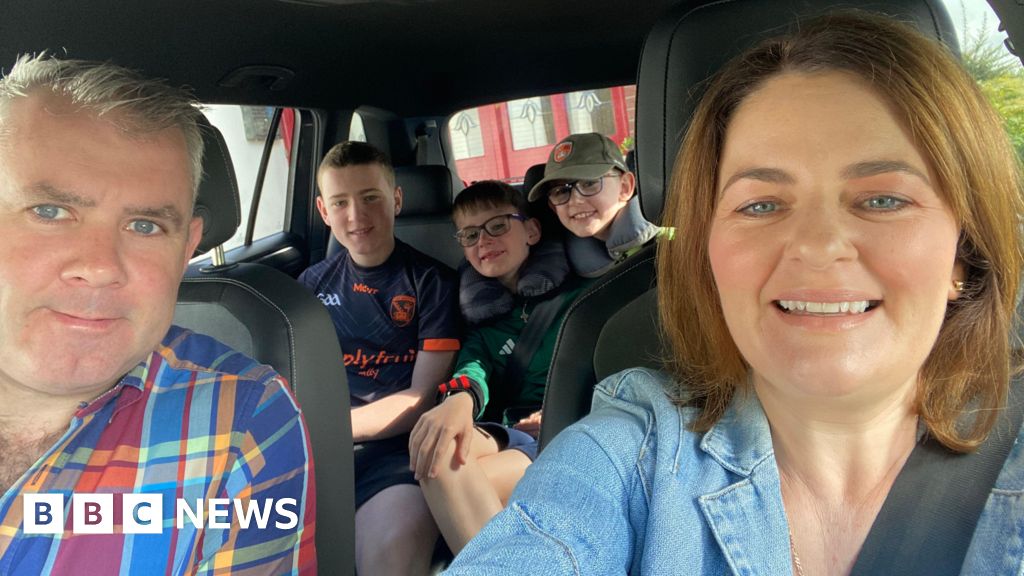A grieving husband has called for an advanced cancer therapy to be more readily available for patients from Northern Ireland after his wife died while receiving care in London, away from her three sons. Fergal Sherry's wife Catherine was diagnosed with lymphoma in September 2024 at the age of 42. She was accepted for CAR (chimeric antigen receptor) T-cell therapy but had to travel to King's College Hospital in London, despite the treatment being available in Dublin, just an hour away from her home in Newry, County Down. "When you are going through cancer treatment you want your family near," he said. The Department of Health (DoH) said there were no plans for the treatment to be made available as part of thecross-border waiting list reimbursement scheme. Under the scheme, which came into effect earlier in June, patients who have been on an NHS waiting list for more than two yearscan pay for procedures in the Republic of Ireland and claim the money back. Mr Sherry said his wife could not get treatment in Dublin as they were told it was not part of "an all-island approach". Mrs Sherry received care in Belfast City and Craigavon hospitals, which Mr Sherry said was excellent. However, he said staff were "annoyed and somewhat even agitated and embarrassed" the treatment his wife needed was not available in Northern Ireland. Mrs Sherry had to make a number of trips to London, including a clinical review and T-cell harvesting for the therapy. CAR T-cell therapy takes the patient's own T-cells, modifies them and then reintroduces them back into the blood stream to help fight the cancer. Mr Sherry said the travelling took a lot out of his wife. "She used all her reserves of energy and strength to travel for the treatment," he toldBBC Radio Ulster's The Nolan Show. "If we lived in England, Scotland or Wales she would have been treated sooner. "If we were allowed to go to Dublin she would have been treated sooner." Mr Sherry stayed with his wife in London throughout the treatment while their three children were at home. He said they would speak to Mrs Sherry and play music on the phone. But the three boys were unable to be with their mother when she died at King's College Hospital London in May. "I wouldn't wish this on anybody, but we unfortunately found ourselves in these circumstances," Mr Sherry added. Mr Sherry said he knew of another person from Northern Ireland who was receiving CAR T-cell treatment in Manchester, but the travelling became too much for them and they were unable to continue. He said he wants to raise awareness of the issue because his wife did not want any other families to be away from home during treatment. Mr Sherry added his wife had told him: "No mammy should have to be away from their children." He has called for a more joined-up approach, as the therapy is available in England, Scotland, Wales and the Republic, but not in Northern Ireland. In a statement to The Nolan Show, the DoH said the treatments were available "on an equitable basis for people from Northern Ireland". "The process involves the local clinician making a referral, which is then considered by a national panel of experts who assess which patients are eligible," a spokesperson said. "There are no plans for this treatment to be made available to people from Northern Ireland as part of the cross border Waiting List Reimbursement Scheme."
'No mum should have to leave her children for cancer treatment'
TruthLens AI Suggested Headline:
"Husband Advocates for Improved Access to Cancer Treatment in Northern Ireland"
TruthLens AI Summary
Fergal Sherry is advocating for improved access to advanced cancer therapies in Northern Ireland after the tragic death of his wife, Catherine, who passed away while receiving treatment in London. Catherine was diagnosed with lymphoma in September 2024 at the age of 42 and was accepted for CAR T-cell therapy, a treatment that modifies a patient's T-cells to combat cancer. Despite this therapy being available in Dublin, just an hour away from their home in Newry, County Down, she was required to travel to King's College Hospital in London for her treatment. This situation not only caused logistical challenges but also emotional distress, as Catherine had to endure multiple trips away from her three young sons. Fergal expressed that during such a difficult time, having family nearby is crucial for both emotional support and care. He noted that the healthcare staff in Northern Ireland were aware of the limitations of treatment availability and shared in the frustration of the situation.
Mr. Sherry highlighted the need for a more integrated healthcare approach across the island of Ireland, stating that if they had been allowed to access treatment in Dublin, Catherine might have received timely care. He pointed out that while the Department of Health in Northern Ireland maintains that treatments are available on an equitable basis, there are currently no plans to include CAR T-cell therapy in the cross-border waiting list reimbursement scheme. This scheme, which allows patients to seek treatment in the Republic of Ireland and claim costs back if they have been on an NHS waiting list for over two years, did not apply to Catherine's situation. Tragically, she passed away in May, and her children could not be with her during her final moments. Mr. Sherry hopes to raise awareness about the challenges faced by families in similar situations, as his wife believed no mother should have to leave her children for cancer treatment, emphasizing the emotional toll that such separations can inflict on families dealing with serious illnesses.
TruthLens AI Analysis
You need to be a member to generate the AI analysis for this article.
Log In to Generate AnalysisNot a member yet? Register for free.
